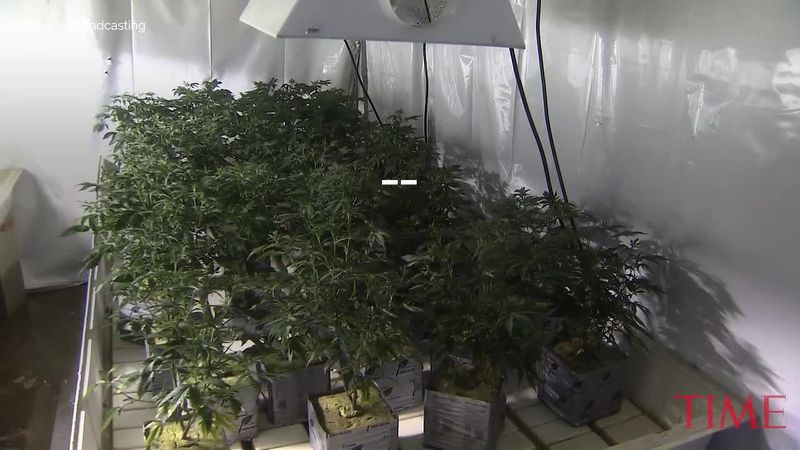Sen. Thom Tillis, a powerful Republican from North Carolina, suggested in a letter shared with Business Insider that the Senate Judiciary Committee is “likely” to discuss marijuana legalization this year.
The letter was addressed to Rod Kight, a North Carolina lawyer who works with companies in the cannabis industry.
Kight first wrote a letter to Tillis in support of two bills — Ending Federal Marijuana Prohibition Act of 2017 and The Marijuana Justice Act — that both seek to de-schedule marijuana and effectively legalize the drug at the federal level. Kight was advocating on behalf of the bills for the National Organization for the Reform of Marijuana Laws (NORML).
New Jersey Sen. Cory Booker, who sponsored the Marijuana Justice Act, sits on the Senate Judiciary Committee with Sen. Tillis.
“Proposals to legalize marijuana should not be taken lightly,” Sen. Tillis wrote in the letter. “As you may know, I am a member of the Senate Judiciary Committee, and this issue will likely be discussed this Congress.”
“If this issue comes before the Judiciary Committee or the full Senate, I will carefully consider everything you have said in making a decision on what is best for North Carolina and the country,” he added.
Daniel Keylin, Sen. Tillis’ communications director, told Business Insider in an email that Tillis is referring to a more general “discussion” between members of Congress on the issue of marijuana legalization, rather than a “specific floor action.”
Nine states and Washington D.C. have legalized cannabis, though it’s considered an illegal, Schedule I drug by the federal level.
In his letter, Kight says he became a support of legal access to marijuana after surviving cancer. He used marijuana to alleviate symptoms of sleeplessness and nausea associated with chemotherapy, and he has built a practice advising cannabis companies that operate legally within state laws.
Kight circulated a response to Tillis’ letter, addressed to the full Judiciary Committee, outlining his argument for the federal legalization of marijuana.
Though Tillis, a Republican, is not a strong supporter of legalizing marijuana, he cosponsored a piece of legislation last year with Utah Sen. Orrin Hatch — the MEDS Act — to expand research into the medical benefits of marijuana.
“For me, it is crucial that we continue to educate ourselves on all the short-term and long-term consequences of marijuana use before we consider unrestricted legalization of the drug,” Tillis wrote in his letter to Kight.
The Trump Administration is no friend to legal cannabis
President Donald Trump’s administration has not been friendly to marijuana legalization efforts. Led by Attorney General Jeff Sessions — a noted cannabis opponent — the Justice Department has rescinded Obama-era protections directing the Justice Department to leave state-legal cannabis businesses alone. That move may put the industry’s future in jeopardy. A growing chorus of lawmakers on both sides of the aisle blasted Sessions’ decision, though many leaders in the cannabis industry were unperturbed.
That, however, has not stopped states from experimenting with marijuana legalization. California, the US’s most populous state, opened recreational sales of marijuana to adults over the age of 21 on January 1. And Vermont recently became the first state to legalize marijuana through the legislature, rather than by a popular vote.
The industry is booming. Job growth in the cannabis industry is now outpacing some of the fastest-growing fields in the US, including tech and healthcare, and analysts expect it could become a $21 billion industry in the next three years.
Here’s the full text of Tillis’ letter:
“Thank you for taking the time to share your thoughts regarding the legalization of marijuana. I appreciate you taking the time to contact me and welcome the opportunity to respond.
Proposals to legalize marijuana should not be taken lightly. I understand that many individuals believe marijuana use is benign. The fact remains, however, that marijuana use can result in adverse health consequences, particularly among adolescents. It goes without saying that a product which has adverse psychological and physiological impacts on its user can ultimately harm third parties. For me, it is crucial that we continue to educate ourselves on all the short-term and long-term consequences of marijuana use before we consider unrestricted legalization of the drug. It is my goal to pursue policies that protect our nation’s youth from the dangerous consequences of illegal drug use and help produce productive and responsible members of society.
As you may know, I am a member of the Senate Judiciary Committee, and this issue will likely be discussed this Congress. If this issue comes before the Judiciary Committee or the full Senate, I will carefully consider everything you have said in making a decision on what is best for North Carolina and the country.
Again, thank you for taking the time to contact me. It is important for elected officials to hear directly from citizens on issues that affect the state and the nation. Please do not hesitate to get in touch with me again about other important issues.
credit:420intel.com












